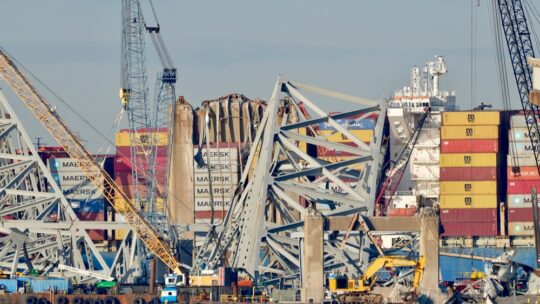
The containers aboard the Dali cargo ship were finally taken off the vessel three months after the ship crashed into Baltimore, Maryland's Francis Scott Key Bridge. The subsequent bridge collapse drew global attention while also causing major disruptions in the supply chain.
If you asked consumers about the supply chain just five years ago, they would probably tell you they knew little about the industry. Supply chains rarely garnered buzz before the pandemic; however, the immediate need for goods, like toilet paper in 2020, highlighted major weaknesses in global supply chains. The Ever Given container ship that blocked the Suez Canal in 2021 quickly became a meme as more and more attention shifted to the logistics industry and its key players.
Today, the average consumer can likely name several major disruption events while still knowing little about the intricacies of the supply chain. The logistics industry faces a problem: It is only recognized for its catastrophic failures, like the bridge collapse, rather than being recognized for its innovation and growth in the $26B industry. Logistics companies are fighting to establish positive reputations before these disastrous occurrences happen.
Here are three ways companies can achieve a better reputation before a crisis hits.
Develop Reporter Relationships Before Disruption Strikes
Don’t wait to curate relationships with the media until the company has news to share with the public. Thought leadership is crucial when building brand awareness and reputation before a disruption. Highlighting a company’s expertise in the industry through contributed content, podcast interviews or broadcast appearances helps put a face to the brand. This can only be achieved through consistent reporter outreach. In turn, those reporters will seek out that company's experts to comment on repairing disruptions, even when that company isn’t involved.
Manage Online Feedback Proactively
Supply chain crises aren’t always the container ship disruptions that are top of mind for consumers. Logistics companies also have to monitor their online reputation as an employer, service provider and innovator. It’s crucial all brands develop a strategy for negative feedback on platforms like Glassdoor and Reddit, but supply chain leaders must be extra attentive. Why? Since historical disruptions have created negative experiences for customers, they may be more inclined to associate a specific brand with frustration. Communication leaders should create a messaging road map for replying to online comments to effectively highlight the positive work a brand does.
Earn Industry Recognition
Accolades from credible awards and conferences can be used in a pinch to communicate a brand’s successes when a disruption occurs. Winning awards or speaking at industry events can build an arsenal of material used to bolster a brand. If the company has been positively recognized in the industry, mishaps won’t immediately soil its reputation, as its done the repetitions needed to build third-party credibility. Treat awards and speaking opportunities as a tool in the reputation toolkit.
Mitigating crisis is important, but you can’t always predict what disruption or news-breaking event will happen in an industry. So, spend additional time and effort building brand reputation. When a crisis does occur, consumers already have an understanding that your brand is trustworthy.
Macie McCallum is a Specialist at Next PR.
